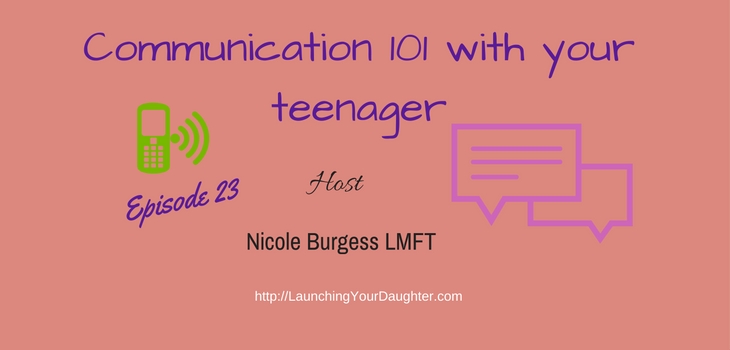[spp-player poweredby="off" url="http://traffic.libsyn.com/launchingyourdaughter/Ep_23_Communication_101_with_teenagers.mp3"]

Today’s episode is about communicating more effectively with your teenage daughter through reflective listening and assertive communication. You are role modeling problem solving skills to her using these skills.
In this episode you will learn:
- Brain develops from back to front
- Teens don’t have full frontal lobe until they are 24 to 26 years old
- Frontal lobe impacts executive functioning and impulse control
Listening:
- Reflective listening or Active listening
- Improve problem solving skills for your teen daughter
- Parents ask yourself if this is your problem or hers.
- Does this problem interfere with my rights or responsibilities?
- Does it involve the safety of my teen or others?
- If no then her problem
- You will reflect the emotions back or guess what she maybe feeling if she hasn’t stated an emotion
- Don’t force her to talk about what is going on if she doesn’t want to and let her know you are there for her
- Reflect both the positive and the negative times with her
Communication Styles:
- Passive communication-eyes down, withholding talking to other person for days or giving them a silent treatment. Considered emotional abuse if you are not stating you need to take a conflict time-out or keep communication lines open
- Aggressive communication-name calling, yelling, using physical intimidation is also considered emotional or verbal abuse
- Assertive communication or using “I” statements is the healthy way to communication
- Example: When _______________ (name the behavior), I feel ______________(state your emotion) because _________________. When we have plans to spend time together and you change your mind, I feel disappointed because I’ve been looking forward to being you.
- Using “I” statements shows we are responsible for our own emotions and not blaming or criticizing.
- Non-verbal communication needs to be open body language, eye contact and facing person
- If the issue is hers and she wants feedback to possible solutions
- Use open questions that start with when, what, who, which, where or how
- Gain understanding and clarify the problem
- Use brainstorming to find solutions
- Evaluate the ideas from brainstorming
- She needs to pick a solution
- Get a commitment and set a time for evaluating the solution
- If the issue is yours-you can use the above steps
Book Recommendations: (Affiliate link)
- Nonviolent Communication-A Language of Life by Marshall B. Rosenberg, Ph.D.
- Parenting from the Inside Out by Dr. Daniel Siegel & Mary Hartzell, M. Ed.
If you liked this episode I invite you to subscribe on iTunes to receive the weekly updates. This podcast is also available on Stitcher, Google Play, YouTube and now iHeartRadio.
Website is www.LaunchingYourDaughter.com
Facebook page: www.Facebook.com/LaunchingYourDaughter/
